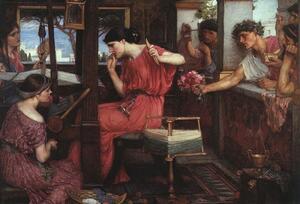Penelope’s Feminist Odyssey
Like many high school students, I read Homer’s The Odyssey in English class. The epic recounts the adventures of the Greek hero Odysseus as he journeys home after the Trojan War, including battles with mythical creatures, cunning deceptions of native populations, and lots of sexual activity with all manner of beautiful goddesses.
Throughout The Odyssey, Penelope, Odysseus' wife, is characterized as constant, virtuous, and patient. She’s seen as the epitome of faithful wifeliness for her refusal to marry a suitor and for her belief that Odysseus will return. Her character is two-dimensional and, for the most part, irrelevant to Odysseus' escapades. When I read The Odyssey, I was upset to see roots of female stereotypes that are still prevalent in society today. I was also disappointed by a clear double-standard; Odysseus sleeps with countless goddesses and is admired as a hero, whereas Penelope is expected to remain chaste for her husband's prolonged absence. In part because of the lack of multi-dimensional female characters, I struggled through The Odyssey when I normally enjoy reading for English class. Whenever Penelope was referenced, I eagerly looked for meaning or recognition of her humanity that never came.
Thankfully, per my English teacher's recommendation, I read Margaret Atwood's The Penelopiad in conjunction with The Odyssey. The novel recounts the story of Odysseus in the voices of Penelope and a singing chorus of twelve maids who were killed by Odysseus for sleeping with the suitors during his absence. The Penelopiad exposed me to a feminist perspective on such a male-dominated text. This version of Penelope is relatable and imperfect, unlike her objectified description in The Odyssey. Atwood portrays her as human; this Penelope is a woman with thoughts, feelings, and desires that make her a multi-angled character.
Not only is The Penelopiad important because it raises issues about female representation in classic texts, but also because it addresses issues of inequality based on class that are glossed over in the original piece. The alternating narratives between Penelope and twelve of her most trusted maids, hanged by Odysseus upon his return to the palace, reveal the harsh differences between Penelope’s life as queen and the experiences of those in her service. The maids describe their various responsibilities and chores and their inevitable objectification and rape by male visitors to the palace. In all of the fairy tales and historical fiction that I've read over the years, never had I seen the struggles of female servants in a royal court so clearly articulated.
Although Penelope expresses profound guilt and sadness over the maids' deaths, her perspective is clearly influenced by her own position of power. Instead of regretting the inherent inequality that leaves her maids powerless when raped by the suitors, Penelope accepts the rape of servants as a common social practice. In fact, she even explains that male guests expected unhindered access to the servants as part of their visits to other palaces. Penelope’s self-awareness about her own marginalization as a woman starkly contrasts with her apparent blindness to the situation of her maids. This lack of recognition of intersectionality sends a clear message to the reader; even though Penelope doesn’t seem to recognize the influence of class on the maids’ lives, Atwood implies that we, the readers, should.
Since reading The Penelopiad, I've become much more aware of female representation in the media that I consume. I look for female protagonists, movies that pass the Bechdel test, and women with roles that aren't simply in relationship to the men around them. I see The Penelopiad as a feminist book because it addresses issues of gender inequality in a traditional text. The Penelopiad influenced how I read The Odyssey and how I consume media; now, I’m more cognizant of the voices and perspectives that aren’t heard, the stereotypes that are assumed and unchallenged. Now, when I’m upset by portrayals of women in the books, movies, and music that I consume, I turn to my marked-up copy of The Penelopiad for consolation.
This piece was written as part of JWA’s Rising Voices Fellowship.







